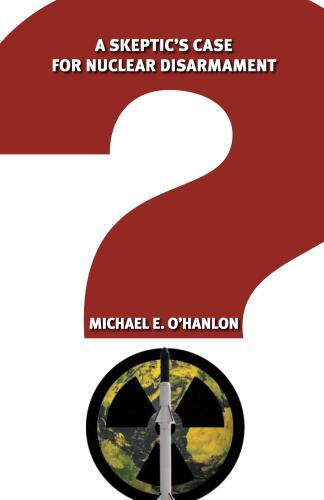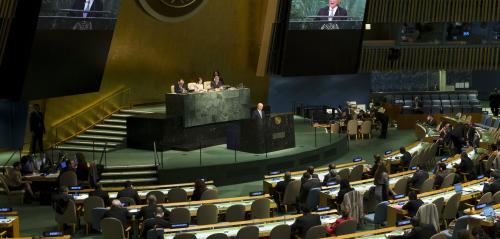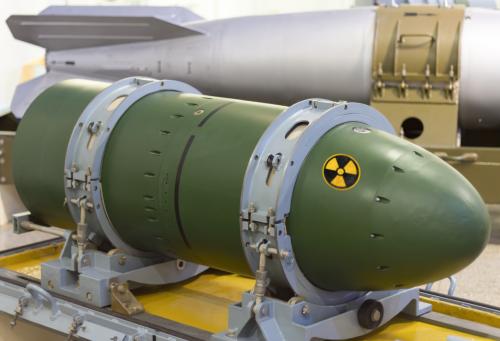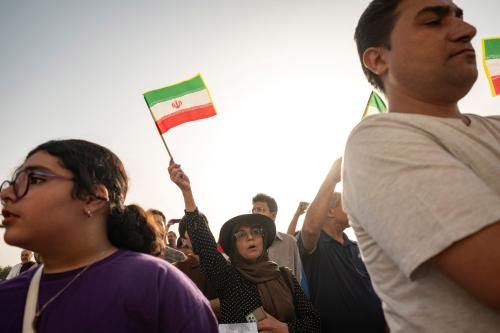In Michael O’Hanlon’s 2010 book “A Skeptic’s Case for Nuclear Disarmament,” he wrote that he shares the goal of a nuclear-free world but fears that rushing to achieve it by a particular date is not only unrealistic but dangerous. In light of the news that the International Campaign to Abolish Nuclear Weapons has won this year’s Nobel Peace Prize, below is a newly-relevant excerpt from O’Hanlon’s book. You can buy the book here.
This book does not argue against the notion of nuclear abolition; it is in fact a friendly skeptic’s case for nuclear disarmament. But I emphasize the conditions and caveats that would have to accompany any such treaty regime—including clear rules for ways the major powers might consider temporarily rearming themselves with nuclear arms in the event of a future violation of the treaty regime, even after weapons had been eliminated. The scenarios here are potentially more complex than many nuclear disarmament advocates have acknowledged to date. What if a dangerous country is suspected of having an active nuclear weapons program, and verification cannot resolve the matter? What if a country develops an advanced biological pathogen with enormous potential lethality—and perhaps even an antidote to protect its own people? Would nuclear deterrence truly be irrelevant or inappropriate as a means of addressing such a problem?
Many, if not most, advocates of nuclear disarmament consider the abolition of nuclear weapons the moral equivalent of the abolition of slavery—and imply that, just as with slavery, once eliminated, nuclear weapons should be gone for good (absent a blatant violation of the treaty by a country that chooses to build a nuclear arsenal in the future). This is a dangerous way to portray the vision of disarmament, however, for it would deprive the United States of deterrent options that may be needed someday given the unpredictable future course of human history. In other words, even once nuclear weapons are eliminated, they may not be eliminated forever. At a practical level, the world will likely have many nuclear power plants as well as all the nuclear waste that nuclear bomb and energy programs will have generated; fissile material can be gleaned from all of these sources. The knowledge to make nuclear weapons will not disappear, and relevant nuclear materials will not do so either.
What of the issue of timing—not only of when to try to negotiate and then implement a treaty but how to describe the vision of nuclear disarmament in the short term? Many nuclear disarmament advocates pull back the minute anyone asks if they want a treaty soon, recognizing the impracticality of trying to abolish nuclear weapons in the next few years. But they are the ones who elevated the idea in the contemporary nuclear debate to a level not seen for many decades, so putting off the timing issue is neither consistent nor advisable. In fact, there are good reasons to have this debate now. Eliminating nuclear weapons from the face of the Earth has technically been a goal of U.S. policy since the 1960s, for example. Moreover, the slowness of negotiating the recent New START Treaty with Moscow and the likely slow ratification debates over both it and the Comprehensive Nuclear Test Ban Treaty in the coming years suggest the possibility that nuclear debates will bog down in technicalities and mundane practicalities, losing sight of the big picture. So bold ideas are useful to provoke fresh thinking and serious action. That said, the ideas of nuclear disarmament advocates are already raising questions around the world about how long the American extended deterrent can be depended upon to help ensure regional peace in key theaters. The resulting perceptions can in turn affect countries’ decisions about whether to pursue their own bombs—not only extremist nations but even friendly states that worry they may no longer be able to depend on the United States.
I argue for a middle-ground position. Moving to nuclear disarmament soon by trying to write a treaty in the next few years is too fast. But dropping the subject for now and waiting for the 22nd century or some other distant date is too slow.
In addition to possibly spooking U.S. allies who worry about how they will ensure their security in a dangerous world, there are two problems with trying to abolish nuclear weapons too soon. Deterrent arrangements that are working today, but that are also somewhat fragile, could be disrupted; and states entirely disinterested in nuclear disarmament might be encouraged to build up arsenals in the hope that their nascent nuclear power might be greater as the existing nuclear powers build down. The main problem, though, is that the nuclear disarmament notion simply lacks credibility in a world in which even some existing nuclear powers clearly have no interest in denuclearizing anytime soon (even if the United States did). Absent a serious process for moving toward zero, declaration of ambitious but arbitrary and unattainable deadlines for action is more likely in the end to discredit the initiative than to advance it.
The problem with putting off debate about nuclear disarmament, however, is that existing powers remain in a weak position to pressure would-be proliferators to abstain from the pursuit of nuclear weapons. Procrastination also perpetuates a false sense of complacency about the supposed safety of living with the bomb. What is needed is a prudent form of urgency. Neither haste and impetuousness nor indefinite postponement of the issue will do.
The United States should endorse a nuclear-free world with conviction, as President Obama did in his 2009 Prague speech. But it should not work to create a treaty now and should not sign any treaty that others might create for the foreseeable future. The right time horizon for seriously pushing a new nuclear accord is when most of the world’s half dozen or so major territorial and existential issues involving major powers are resolved—and this cannot be set to a calendar as precisely as the Global Zero movement would like.
The Brookings Institution is committed to quality, independence, and impact.
We are supported by a diverse array of funders. In line with our values and policies, each Brookings publication represents the sole views of its author(s).









Commentary
The dangers of rushing to a nuclear-free world
October 6, 2017